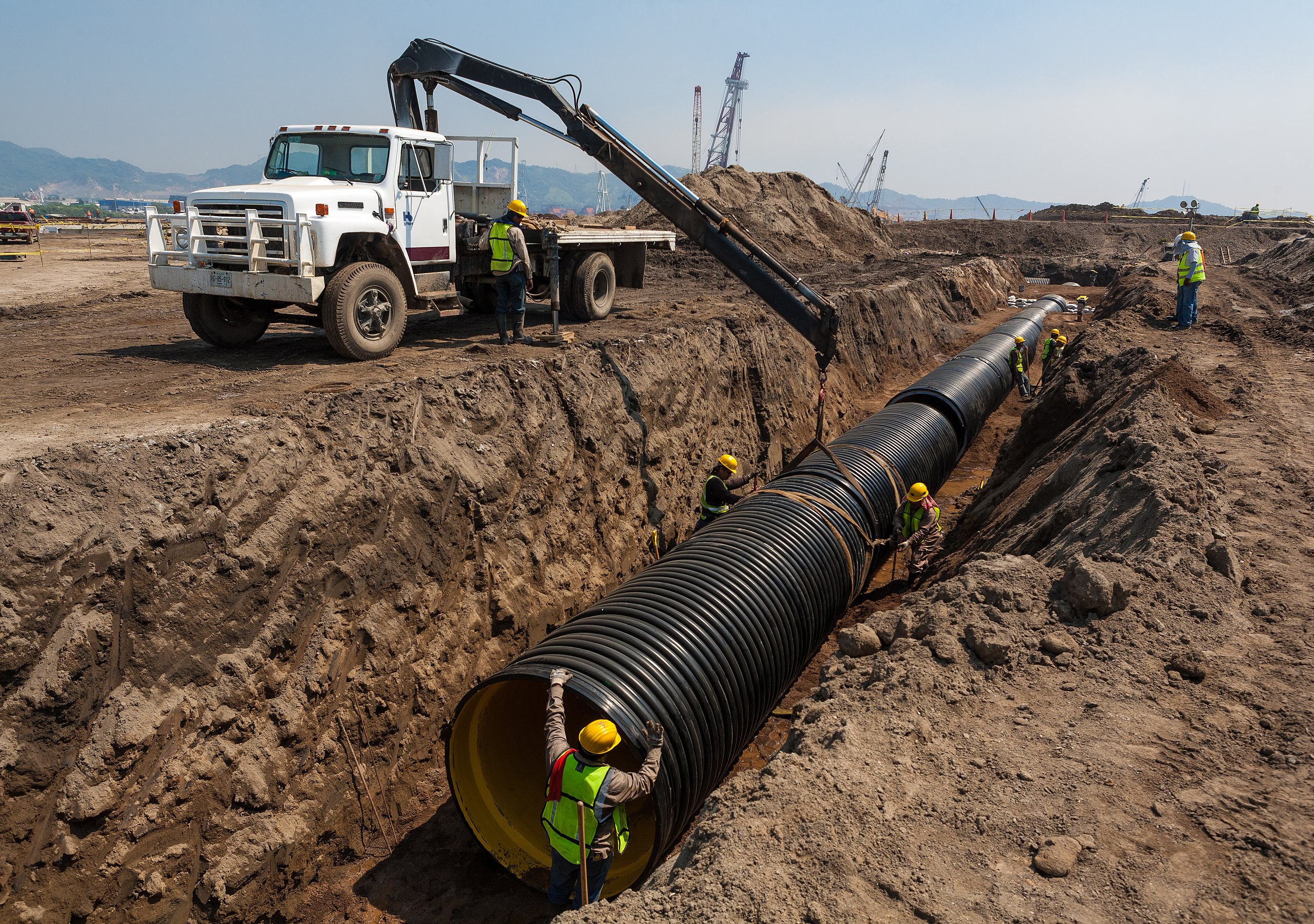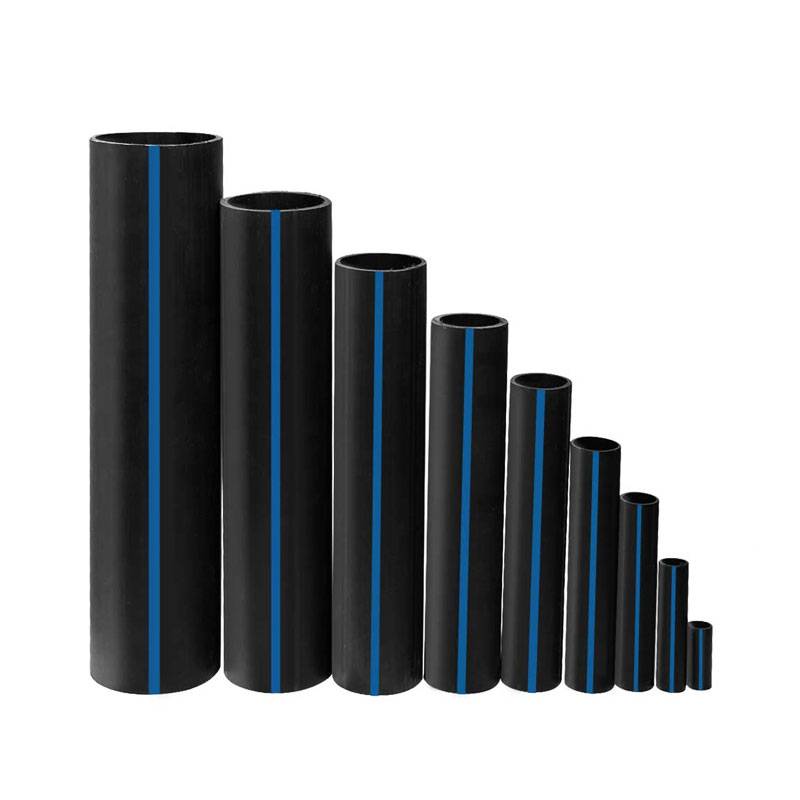A Comprehensive Guide to the Various Uses of HDPE Pipe in Construction and Sector
HDPE pipes have actually emerged as a critical component in modern construction and commercial applications. Their one-of-a-kind properties, such as resistance to deterioration and light-weight design, make them appropriate for a wide range of usages. From water supply systems to agricultural irrigation, HDPE pipelines provide services that enhance efficiency and sustainability. Understanding their diverse applications is necessary for professionals aiming to optimize facilities. What certain advantages do these pipelines offer each sector?
Supply Of Water and Circulation Systems
Water system and circulation systems are important components of city facilities, commonly relying upon high-density polyethylene (HDPE) pipes for their sturdiness and effectiveness. These systems transport drinkable water from therapy centers to customers, guaranteeing accessibility and safety and security. HDPE pipelines are favored for their resistance to deterioration, chemicals, and severe temperatures, which boosts their longevity and lowers maintenance prices. Furthermore, their lightweight nature permits much easier setup and transport, making them ideal for numerous urban and country applications.
The versatility of HDPE pipelines enables them to be installed in limited spaces and around challenges, minimizing the demand for considerable excavation (American Plastics HDPE Pipe for Oilfield). Furthermore, their smooth interior surface minimizes friction losses, enhancing water circulation rates. As cities proceed to grow, the demand for reliable water systems raises, positioning HDPE pipes as a sustainable service for contemporary facilities tasks. Their tried and tested record makes them a preferred choice among engineers and city planners alike
Wastewater Management and Therapy
Effective wastewater management and treatment are crucial for maintaining public health and ecological quality. HDPE pipes play a vital function in this procedure because of their toughness, resistance to corrosion, and capacity to stand up to severe chemicals. These pipes are generally used in numerous applications, including sewer system, stormwater drain, and wastewater treatment centers. Their light-weight nature helps with much easier installment and transportation, lowering labor expenses and time.
On top of that, HDPE pipes have a smooth interior surface area that decreases friction loss, promoting reliable flow prices. They are additionally less susceptible to leakages and failings compared to conventional products, making sure that pollutants are contained successfully. Moreover, their versatility enables adaptability in numerous dirt conditions, making them suitable for diverse ecological settings. As sectors significantly focus on lasting techniques, making use of HDPE pipes in wastewater monitoring systems lines up with goals for reducing ecological effect and improving source healing.
Agricultural Watering Solutions
In agricultural settings, reliable watering remedies are necessary for optimizing crop yields and taking care of water resources. HDPE (High-Density Polyethylene) pipes play an essential role in modern-day watering systems because of their durability, versatility, and resistance to corrosion. Their capability to hold up against high pressures makes them ideal for both surface and subsurface watering applications, guaranteeing consistent water distribution across fields.
Farmers can make use of HDPE pipes in drip watering systems, right here which supply water straight to plant roots, decreasing waste and promoting healthy and balanced growth. In addition, these pipes are lightweight and simple to set up, minimizing labor costs and setup time. Their lengthy life expectancy and low upkeep needs better improve their appeal in farming techniques.
HDPE pipes are environmentally friendly, as they can be recycled and do not leach hazardous chemicals into the dirt. This makes them a sustainable choice for farmers intending to take on eco-friendly farming techniques while taking full advantage of productivity.
Industrial Applications and Processes
Adaptability is a trademark of HDPE pipes, making them indispensable in various industrial applications and procedures. These pipes are extensively used in chemical processing markets because of their outstanding resistance to a variety of destructive materials. HDPE's light-weight nature, integrated with high tensile stamina, permits simple installation and long-lasting performance in demanding settings.
In the oil and gas market, HDPE pipelines play a crucial duty in moving hydrocarbons and gases, many thanks to their resilience and versatility - hdpe pipe in stock Midland TX. Additionally, they are used in mining operations for the transportation look at this now of slurry and other materials, where traditional piping systems may fall short
In addition, HDPE pipes are increasingly made use of in manufacturing facilities for water supply lines and wastewater management. Their capacity to withstand severe temperature levels and pressures makes them suitable for a selection of industrial processes. Overall, HDPE pipelines add greatly to effectiveness and security across diverse industrial applications.
Stormwater Management and Drainage Solutions
Stormwater administration and drainage systems are essential components in urban facilities, created to manage excess rains and minimize flooding dangers. High-density polyethylene (HDPE) pipelines are increasingly made use of in these systems as a result of their durability, versatility, and resistance to rust. These pipes efficiently deliver stormwater away from inhabited areas, reducing surface area runoff and preventing waterlogging.
HDPE's light-weight nature helps with simpler setup, lowering labor expenses and building and construction time. Furthermore, its resistance to chemicals and ecological stress factors guarantees long life and reliability in various environments. Along with typical drainage applications, HDPE pipes are also employed in cutting-edge remedies such as environment-friendly infrastructure, resource which includes rainfall yards and permeable pavements.

Regularly Asked Concerns
Exactly How Does HDPE Pipe Compare to PVC Pipe in Expense?
As a whole, HDPE pipe tends to be much more costly than PVC pipe due to its improved durability and versatility. Lasting price factors to consider, such as upkeep and life-span, may favor HDPE in certain applications.
What Is the Life-span of HDPE Piping Under Numerous Conditions?
HDPE pipelines typically have a life-span of 50 to 100 years, relying on ecological conditions, installment practices, and use. Factors such as temperature level, soil kind, and direct exposure to chemicals can significantly affect their toughness.
Can HDPE Piping Be Recycled After Usage?
Yes, HDPE pipes can be reused after usage. The recycling process involves melting down the material, allowing it to be repurposed into new products, thus promoting sustainability and minimizing environmental effect connected with plastic waste.
Exist Any Kind Of Specific Installment Challenges With HDPE Pipes?
Setup difficulties with HDPE pipelines include appropriate jointing strategies, ensuring adequate trench problems, and taking care of thermal development. Additionally, competent labor is needed to deal with specific equipment, which can make complex the installment process in different settings.

What Certifications Should I Try To Find When Acquiring HDPE Water Lines?
When buying HDPE pipelines, one need to search for qualifications such as ASTM, AASHTO, and ISO, which validate quality and compliance with sector criteria, assuring longevity and efficiency in numerous applications. - Texas hdpe pipe manufacturer